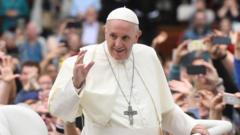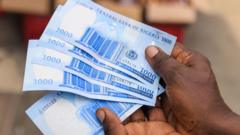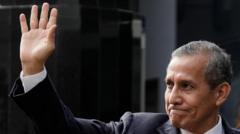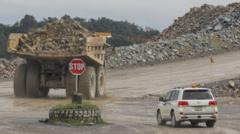Ghana's newly elected President, John Mahama, is under immense pressure to meet voters' high expectations following his decisive victory against Vice-President Mahamudu Bawumia.
New Era for Ghana: Mahama Faces High Expectations After Election Win

New Era for Ghana: Mahama Faces High Expectations After Election Win
John Mahama returns to power in Ghana, promising jobs and economic reform amid pressing public expectations.
Mahama, who served previously from 2012 to 2016, reclaimed the presidency with a substantial 56.6% of the vote compared to Bawumia's 41.6%. Political analysts describe his campaign strategy as a "masterclass," particularly under conditions where voter turnout dipped compared to the previous election. This decline, particularly in regions historically aligned with the New Patriotic Party (NPP), reflected growing disillusionment with the incumbent government’s handling of the economy.
As supporters celebrated Mahama's return, the new government faces significant challenges induced by a bruising economic downturn that has led to rampant inflation and widespread hardships. Teacher Belinda Amuzu from Tamale encapsulated the prevailing public sentiment: "I'm expecting the new government to change the economy, so that the hardship will come down."
Economists maintain that Mahama must deliver credible leadership and efficiency in public service to mitigate the economic malaise that has gripped the nation. His plan includes reducing the cabinet size to 60 and prioritizing merit-based appointments as opposed to political loyalty. Mahama's Vice-Presidential pick, Prof. Naana Jane Opoku-Agyemang, makes history as the first woman to hold the office, a move celebrated as a significant advancement in gender representation.
During his first term, Mahama's focus on infrastructure was overshadowed by economic woes, resulting in a loss in the 2016 elections. However, as the country grapples with the aftermath of the COVID-19 pandemic, voters have begun to appreciate past infrastructural investments. Economic recovery strategies include creating jobs, notably through night-time economy initiatives, abolishing burdensome taxes, and incentivizing businesses to operate longer hours.
Mahama is optimistic about improving fiscal efficiency and addressing poverty amid a looming IMF loan, pledging to renegotiate conditions to allow for social programs. Critics remain skeptical about the feasibility of such promises, questioning budgetary constraints. Yet, Mahama asserts that prudent financial management can lead to a balanced economy.
The former president has also vowed to crack down on corruption within government ranks, a pledge aimed at erasing the legacy of misconduct from previous administrations. In taking over the reins next month, Mahama must demand fiscal accountability during the transition to establish a firm foundation for his new government.
Analysts suggest that his ability to navigate these challenges hinges on meeting public expectations, echoing Mahama's own remarks during his victory speech: "We cannot afford to disappoint them. Forward ever - backwards never." His administration will be pivotal in determining whether Ghana can reverse its economic decline and restore public trust.
As supporters celebrated Mahama's return, the new government faces significant challenges induced by a bruising economic downturn that has led to rampant inflation and widespread hardships. Teacher Belinda Amuzu from Tamale encapsulated the prevailing public sentiment: "I'm expecting the new government to change the economy, so that the hardship will come down."
Economists maintain that Mahama must deliver credible leadership and efficiency in public service to mitigate the economic malaise that has gripped the nation. His plan includes reducing the cabinet size to 60 and prioritizing merit-based appointments as opposed to political loyalty. Mahama's Vice-Presidential pick, Prof. Naana Jane Opoku-Agyemang, makes history as the first woman to hold the office, a move celebrated as a significant advancement in gender representation.
During his first term, Mahama's focus on infrastructure was overshadowed by economic woes, resulting in a loss in the 2016 elections. However, as the country grapples with the aftermath of the COVID-19 pandemic, voters have begun to appreciate past infrastructural investments. Economic recovery strategies include creating jobs, notably through night-time economy initiatives, abolishing burdensome taxes, and incentivizing businesses to operate longer hours.
Mahama is optimistic about improving fiscal efficiency and addressing poverty amid a looming IMF loan, pledging to renegotiate conditions to allow for social programs. Critics remain skeptical about the feasibility of such promises, questioning budgetary constraints. Yet, Mahama asserts that prudent financial management can lead to a balanced economy.
The former president has also vowed to crack down on corruption within government ranks, a pledge aimed at erasing the legacy of misconduct from previous administrations. In taking over the reins next month, Mahama must demand fiscal accountability during the transition to establish a firm foundation for his new government.
Analysts suggest that his ability to navigate these challenges hinges on meeting public expectations, echoing Mahama's own remarks during his victory speech: "We cannot afford to disappoint them. Forward ever - backwards never." His administration will be pivotal in determining whether Ghana can reverse its economic decline and restore public trust.





















